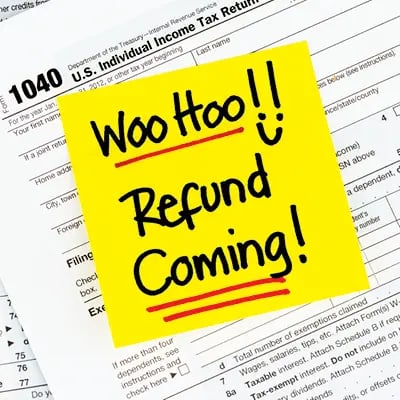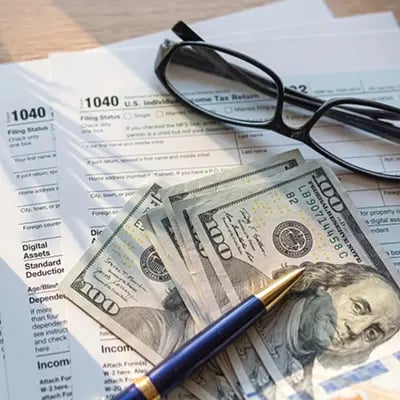
Key Highlights
- Pay off high-interest debt to save money on interest and improve your finances.
- Build your emergency fund to cover unexpected costs during tough times.
- Invest in retirement accounts for long-term growth, even with inflation.
- Invest in yourself through education or starting a side job to increase your earning power.
- Make a budget to track spending and make smart money choices during inflation.
Introduction
Many Americans look forward to their tax refunds every year. But when prices are rising due to inflation, it's extra important to use your refund wisely. Inflation means the value of money goes down over time, so you need to be strategic with your refund to make the most of it. It might be tempting to splurge on something fun, but using your refund smartly can really help your financial situation. Inflation makes it even more crucial to prioritize your long-term financial health. Let's break down what inflation is and how it affects everything we buy.
Understanding Inflation
Inflation happens when prices go up over time, so your money can't buy as much as it used to. When inflation hits, the value of each dollar drops. That's why it's always smart to make good money choices during inflation to protect your hard-earned cash.
To fight the effects of inflation, you need to make strategic money moves that preserve and grow your wealth. This means focusing on high-interest debt, building your emergency fund, investing for the future, investing in yourself and budgeting carefully. By understanding how inflation affects your money, you can make informed choices with your tax refund to lessen its impact.
1. Prioritize High-Interest Debt

When you get your tax refund, one of the best things you can do is pay down high-interest debt, like credit card balances or personal loans. During inflation, interest rates often go up, too. By tackling your debt, you can save money on future interest and improve your long-term financial health.
Let's say you have a $5,000 credit card balance with an 18% yearly interest rate. If you only pay the minimum $150 each month, it'll take over three years to pay off, and you'll pay around $2,000 in interest. But if you get a $2,000 refund and use it to pay down that $5,000 credit card debt, you'll save about $1,500 in interest and be debt-free almost two years sooner.
Smart Strategy: Debt consolidation loans can be a powerful tool for managing high-interest debt during inflationary times. A PrimeWay debt consolidation loan allows you to combine multiple debts, such as credit card balances, personal loans or medical bills, into a single, lower-interest loan. It is important to know that debt consolidation is a tool to combine all your debts into one, offering a lower interest rate, not to acquire another loan. Reducing expenses and increasing your savings are the best ways to gain financial stability.
2. Boost Your Emergency Fund
Consider adding to your emergency fund, especially during uncertain economic times. Try to save enough to cover 3-6 months of living expenses. This provides a safety net for unexpected costs. An emergency fund acts as a buffer, giving you a financial cushion when unexpected costs pop up. Inflation can bring more economic uncertainty, so it's even more important to have some money set aside. Using your tax refund to boost your emergency fund lets you cover surprise expenses without relying on credit cards or loans.
To figure out your goal, add up your average monthly costs for essentials like rent, utilities, groceries, transportation and insurance. Then multiply that number by the number of months you want to save for, usually between 3 and 6. So if your essential monthly costs are $3,000 and you want to save for six months, your emergency fund goal would be $18,000.
Consider PrimeWay's Best Checking to Offset Inflation
Consider using PrimeWay's Best Checking, a high-yield checking account, to maximize your emergency fund. This account offers higher interest rates than traditional checking accounts, allowing your savings to grow slightly faster and potentially beat inflation. Inflation erodes the value of money over time, so it's important to find ways to make your savings work harder.
3. Invest in Your Future
Even during inflation, the key to long-term growth is staying invested in the market. The earlier you start and the more consistently you contribute to retirement accounts, the more time your investments have to grow.
Once you've secured your basic needs and emergency fund, consider investing in your future with your tax refund. Put some of the money into retirement accounts like IRAs or 401(k)s. This lets you take advantage of compound growth and secure your financial future.
These accounts come with tax benefits and let your money grow over the long term. Contributions to traditional IRAs and 401(k)s may give you a tax deduction, lowering your taxable income for the year. Roth IRAs, on the other hand, are funded with after-tax money but offer tax-free growth and tax-free withdrawals in retirement.
Maximizing your retirement account contributions sets you up for a financially secure retirement. Starting early and contributing regularly lets you harness the power of compounding and potentially secure long-term growth, even during times of inflation. If you have questions about getting started, you can schedule a no-cost, no-obligation meeting with a PrimeWay Investment Advisor to answer your questions.

Why Settle for Less When You Can Have the Best?
PrimeWay's Best Checking Account isn't just an upgrade; it's a revolution in personal finance.
4. Invest in Yourself
If you're financially stable, investing in yourself is another smart way to use your refund. Consider spending some of the money on education, learning new skills or starting a small side job.
Investing in your own education or skills can increase your earning potential and open up new opportunities. By gaining new knowledge or valuable skills, you can protect yourself against inflation and improve your long-term financial prospects.
Starting a small side job with your tax refund can also provide additional income streams and contribute to your overall financial well-being. It allows you to diversify your income sources and build resilience during economic uncertainty.
Using your tax refund to invest in yourself is an investment in your future that can impact your financial health.
Tips for investing in yourself:
-
- Education: Enroll in a course, workshop or degree program to expand your knowledge and career opportunities.
- Skills Training: Acquire certifications or take online classes to enhance or learn new skills.
- Side-Hustle: Use the money to start a small business or side hustle for extra income.
Improving your skills, knowledge, and earning potential helps protect you against inflation and boosts your long-term financial outlook.
5. The Importance of Budgeting

Utilizing your tax return wisely is a strategic move, especially during economic uncertainty. Budgeting becomes even more crucial during periods of inflation. Keeping track of your spending and making smart money choices can help you navigate rising prices and protect your financial well-being.
Creating a budget and monitoring your spending gives you more control over your money. You can spot areas where you can cut back, put more money into savings and investments and make sure you're using your income wisely.
Tracking your spending is especially important during inflation to understand how rising prices affect your budget and to make necessary adjustments. By keeping an eye on your spending, you can see exactly where your money is going and find areas to trim costs or allocate funds more effectively.
Budgeting Checklist
| Category | Task |
|---|---|
| Understanding Monthly Expenses | Record every expense for a month |
| Categorize Expenses | Divide expenses into categories (e.g., housing, food) |
| Identify Essentials | Highlight essential expenses (rent, groceries) |
| Setting Your Fund Goal | Add up essential expenses for a monthly total |
| Determine Fund Size | Multiply monthly essentials by 3-6 (months) |
| Adjust for Comfort | Add a 5-10% buffer to the total for unforeseen expenses |
| Creating a Savings Plan | Determine how much to save each month |
| Automate Savings | Set up automatic transfers to your savings account |
| Choose the Right Checking Account | Opt for high-yield accounts with little or no fees. |
| Boosting Your Fund | Reduce spending in non-essential categories |
| Increase Income | Explore part-time jobs or sell unused items |
| Save Windfalls | Deposit bonuses or tax refunds into your emergency fund |
| Resist Temptation | Use the fund only for true emergencies |
| Replenish if Used | Account Management & Monitor: Regularly seek better savings account options |
Frequently Asked Questions
How Can I Prioritize My Spending During Inflation?
During inflation, it's important to prioritize essential expenses while cutting back on discretionary spending. Focus on needs rather than wants and make informed financial decisions that protect your long-term financial health.
Is It Better to Save or Invest My Tax Refund?
The decision to save or invest your tax refund depends on your goals and risk tolerance. Saving is a safer option, while investing offers the potential for higher returns. Consider your financial situation and long-term objectives before making a decision.
How Can I Protect My Savings From Inflation?
To protect your savings from inflation, consider investing in assets that historically outpace inflation, such as stocks, real estate or commodities. Diversifying your investments can help preserve the value of your savings over time.
What Are High-Interest Debts and Why Should They Be a Priority?
High-interest debts, like credit cards and variable-rate loans, incur higher interest rates during inflation. Prioritizing their repayment offers a guaranteed return on investment, saving money in the long run and improving overall financial health.
Can Home Improvements Impact My Financial Security?
Making strategic home improvements can boost financial security. Increasing property value, reducing maintenance costs, and improving energy efficiency can positively impact long-term finances. Consider renovations that offer a good return on investment and align with your financial goals.
How Much Should I Aim to Have in My Emergency Fund?
Aim to have 3-6 months of living expenses saved in your emergency fund. This provides a financial buffer and allows you to have funds to cover unexpected expenses, such as job loss or medical emergencies.
What Are Some Smart Ways to Budget During Inflationary Times?
During inflationary times, track your expenses and adjust your budget to accommodate rising prices. Prioritize essential expenses, find areas where you can cut costs and make informed financial decisions to protect your financial health.
Are There Specific Investments That Are Safer During Inflation?
While no investment is entirely risk-free, some investments have historically performed well during inflation. These include stocks, real estate, commodities and inflation-protected securities. Diversifying your investments can help mitigate risks and safeguard your portfolio.
How Can I Maximize the Value of My Tax Refund?
To maximize the value of your tax refund, consider using it strategically. Prioritize high-interest debt, boost your emergency fund, invest in your future, invest in yourself and budget effectively. By making informed choices with your tax refund, you can maximize the impact on your financial well-being.
What Skills or Education Should I Invest in for Long-Term Financial Health?
Investing in skills and education that align with your long-term financial goals is crucial. Use your growth in your industry, emerging trends and opportunities to increase your earning potential. Continuous learning and skill development can enhance your long-term financial health.
5 Best Ways to Use Your Tax Refund During Inflation
Beat inflation with these 5 smart ways to spend your tax refund. Boost savings, pay down debt and invest for the future.
Conclusion
Using your tax refund strategically is key to protecting your finances during inflation. Focus on paying off high-interest debt, building your emergency fund, investing for the future, investing in yourself and budgeting effectively. This will help you make the most of your refund and overcome the challenges of inflation. Remember to match your refund strategy with your personal financial goals and always make well-informed money decisions.
Need Help Deciding Which Investments Is Right for You?
If you have questions about getting started, you can schedule a no-cost, no-obligation meeting with a PrimeWay Investment Advisor to answer your questions contact PrimeWay today!

